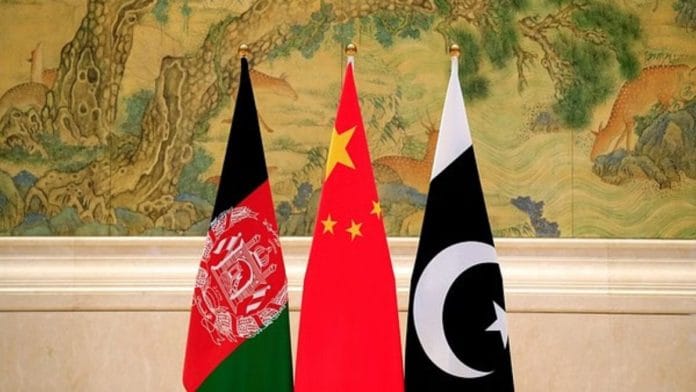New Delhi: India had conveyed its strong opposition to the inclusion of a third country, Afghanistan, in the China-Pakistan Economic Corridor project to both Islamabad and Beijing, calling the move “unacceptable”, Minister of State for External Affairs of India Kirti Vardhan Singh Wednesday informed the Rajya Sabha.
India had also protested against the inclusion of portions of Jammu and Kashmir and Ladakh—illegally occupied by Pakistan—in the CPEC and the Belt and Road Initiative (BRI) infrastructure projects, he added.
India’s position on CPEC was “clear and consistent”, Kirti Vardhan Singh said in a written response to a question submitted by Member of Rajya Sabha Golla Baburao. “Government has consistently protested to parties concerned over the inclusion of the so-called ‘China-Pakistan Economic Corridor (CPEC)’, which passes through parts of the Indian Union Territories of Ladakh and Jammu & Kashmir, under illegal occupation of Pakistan, as a flagship project of ‘OBOR/BRI’ and asked them to cease these activities.”
The MoS added: “Any proposed participation of third countries or expansion of the so-called CPEC projects to third countries is unacceptable. Government has consistently conveyed this position to relevant parties.”
On 21 May 2025, the foreign ministers of China, Pakistan and the Taliban regime in Afghanistan—Wang Yi, Ishaq Dar, and Mawlawi Amir Khan Muttaqi, respectively—met in Beijing as a part of a trilateral mechanism. At the meeting, they decided on expanding the CPEC to Afghanistan to “strengthen the building of regional connectivity networks”, a Chinese readout, at the time, said.
CPEC has long been an issue for New Delhi, considering that the multi-billion-dollar project violates India’s sovereignty in the creation of transportation networks through the illegally occupied portions of Ladakh and J&K.
India has refused to join the BRI, Chinese President Xi Jinping’s trillion-dollar initiative for building transportation infrastructure across countries. BRI, which remains India’s primary issue, includes CPEC.
India’s other concern with BRI is the potential unviability of the projects creating a debt trap, as witnessed in the case of Sri Lanka, among other countries.
A key BRI thrust is the CPEC, the connectivity project that will link Pakistan’s Gwadar port and the Chinese province of Xinjiang. It will reduce Beijing’s reliance on the Straits of Malacca, allowing it to meet its transportation needs for key energy requirements.
India has recently promised to step up its developmental assistance to the Taliban, given that both Islamabad and Beijing have moved forward in engaging with the regime in control of Kabul. In May, Foreign Minister Jaishankar held a conversation with his counterpart, Amir Khan Muttaqi, via telephone, following the Pahalgam terrorist attack and the subsequent Operation Sindoor.
The talks marked the first ministerial-level contact between New Delhi and the Taliban.
Last year, China recognised the Taliban’s envoy to Beijing—the first country to do so. Since the return of the Taliban in Kabul nearly four years ago, the regime has had little international recognition. China, along with Russia and Pakistan, are among the countries that have moved forward with the normalisation of ties with Afghanistan’s Taliban regime.
(Eited by Madhurita Goswami)
Also Read: China-Pakistan ties under stress. CPEC security concerns frustrating Chinese, hurting Pakistanis






